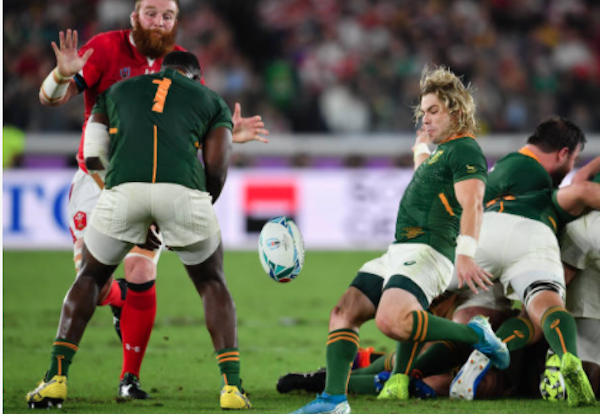Rassie Erasmus has revealed why there were unique nerves ahead of the Springboks’ World Cup semi-final against Wales last year.
In the book Miracle Men, which documents the Springboks’ journey to glory in Japan, Erasmus explains exactly why Wales were seen as such a challenging opposition.
Prior to the semi-final, the Boks had lost their last four games against the Welsh.
‘We try and identify the soul of every team we play against, and it was difficult to find the soul of Wales,’ Erasmus explains in the book. ‘On the Tuesday night I said to Jacques: “I’m not sure we have this team’s soul,” and we sat there and agreed that we didn’t.’
What followed was a brainstorming session with all the coaches and players as they sought to get to the heart of the matter, and find out what made Wales ‘tick’ as a team.
The conclusion was that the Boks felt Wales’ so-called ‘soul’ was not necessarily their game plan, but their ‘patience’.
‘It’s their willingness to persist with the same game plan. That’s how they win Test matches,’ Erasmus says.
That game plan revolved around an enduring persistence with their kicking game, which the Boks realised they had to match.
‘They were going to persist with their kicking game, strangling us, suffocating us, holding us up in tackles, wanting to play in our half. Because they have been doing it for so long and they are successful, they are going to wait for us to crack and start running in our own half. Understanding that was the challenge,’ adds Erasmus.
‘The moment you think, “Flip, I can’t kick this ball back again, I’m going to start running,” is when you’re in trouble. We had to convince the players to have patience until they [Wales] lost the plot a little bit and they started running from their own half.’
ALSO READ: Book reveals Rassie’s referee analysis
The Springboks realised they needed to beat Wales at their own game, fully aware that they kicked around 30 times per game.
With the Boks willing to essentially match them kick for kick, it led to a semi-final that was far from appealing for spectators to watch. However, Erasmus explains they had to be willing to persist with a kicking game.
‘We knew that it was going to be very close because of the similar styles and, if we were going to lose, we knew that people in South Africa would have been pissed off at our style. But that’s the only way you can beat Wales.
‘You can’t beat them any other way. We’ve learnt that from playing them a lot and coaching against their coaches in the PRO14. That’s why it was a nervous game, because if we were going to lose it, we were going to lose it ugly and people would crucify us in South Africa.
‘If we were going to win it, we were going to win it ugly, but people would be happy because we were in the World Cup final. We had to convince the player that this was really the way.’
*The book Miracle Men can be purchased online here





